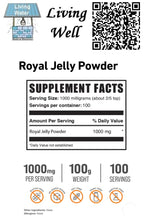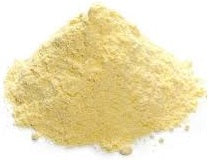
Livingwell Royal Jelly Powder is the ultimate solution for all your health and wellness needs. Packed with an abundance of vitamins and minerals, this potent supplement is a powerhouse when it comes to delivering essential nutrients to your body. With the perfect combination of antioxidants and immune support, Livingwell Royal Jelly powder is a must-have for anyone looking to boost their overall well-being.
What are the benefits of taking royal jelly powder?
- Contains a Variety of Nutrients. ...
- May Provide Antioxidant and Anti-Inflammatory Effects. ...
- May Reduce Heart Disease Risk by Impacting Cholesterol Levels. ...
- May Aid Wound Healing and Skin Repair. ...
- Specific Proteins May Lower Blood Pressure.
Antioxidant properties: Royal Jelly contains antioxidants that help protect cells from damage caused by free radicals, reducing oxidative stress and supporting overall health.
Cognitive function: Royal Jelly may have cognitive-enhancing effects, improving memory, focus, and overall brain function.
Energy boost: Royal Jelly is believed to increase energy levels and combat fatigue, making it beneficial for physical performance and stamina.
Immune system support: Royal Jelly contains compounds that may help strengthen the immune system, enhancing immune response and promoting overall immune function.
Royal jelly may also improve blood sugar control and insulin sensitivity by reducing oxidative stress and inflammation.
Multiple animal studies showed increased insulin sensity and an apparent protective effect on pancreatic, liver and reproductive tissue in obese, diabetic rats treated with royal jelly.
One small six-month human study demonstrated a 20% reduction in fasting blood sugar in healthy people who supplemented daily with royal jelly
Nutrient-rich: Royal Jelly Powder is packed with vitamins, minerals, amino acids, and other nutrients that can support overall health and well-being.
Royal jelly is comprised of water, carbs, protein and fat (1).
The full chemical makeup of royal jelly is unknown, but its positive effects on health are thought to stem from its unique proteins and fatty acids.
These include nine glycoproteins collectively known as major royal jelly proteins (MRJPs) and two fatty acids, trans-10-Hydroxy-2-decenoic acid and 10-Hydroxydecanoic acid.
Try These Exercises With Livingwell Royal Jelly Powder
Royal jelly also contains several B Vitamins and trace minerals.
However, nutrient composition varies considerably between sources of royal jelly .
Some of the vitamins typically present in royal jelly include:
- Thiamine (B1)
- Riboflavin (B2)
- Pantothenic acid (B5)
- Pyridoxine (B6)
- Niacin (B3)
- Folic acid (B9)
- Inositol (B8)
- Biotin
(B7)
These nutrients may provide some of royal jelly’s potential health benefits, though more research on this unique substance is needed.
Both animal and human studies demonstrate that royal jelly may positively impact cholesterol levels and thereby reduce heart disease risk.
Though the exact mechanism remains unclear, specific proteins in royal jelly may help.
One 12-week study found that rabbits supplemented with royal jelly significantly reduced their total and “bad” LDL cholesterol levels by 28% and 23%, respectively .
Similarly, a one-month human study saw an 11% and 4% reduction in total and “bad” LDL cholesterol levels in people taking about 3 grams of royal jelly daily .
Conversely, another small human study determined no significant differences in cholesterol levels between participants treated with royal jelly and those on a placebo
Royal jelly — both used orally and topically — may support wound healing and other inflammatory skin conditions.
It’s known to have an antibacterial effect, which can keep wounds clean and free from infection.
One animal study revealed an increase in collagen production in rats given royal jelly extract. Collagen is a structural protein vital for skin repair.
A test-tube study showed significantly enhanced tissue repair capacity in human cells treated with royal jelly
Royal jelly may protect your heart and circulatory system by reducing blood pressure.
Several test-tube studies indicate that specific proteins in royal jelly relax smooth muscle cells in your veins and arteries, thereby lowering blood pressure.
A recent animal study examined a supplement combining royal jelly with other bee-derived substances and found a significant reduction in blood pressure. However, the exact role royal jelly played in this supplement is unclear
Royal jelly may boost brain function.
One study revealed that stress-induced mice treated with royal jelly had lower levels of stress hormones and a more robust central nervous system than the control group.
A separate study resulted in improved memory and reduced symptoms of depression in postmenopausal rats given royal jelly.
Another animal study showed that rats treated with royal jelly were better able to remove certain chemical deposits in the brain associated with Alzheimer’s disease.
Most of these studies attribute the protective effect on brain and nervous tissue to royal jelly’s antioxidant capacity.
Royal jelly may treat dry eyes when taken orally.
One animal and one small human study showed improvements in chronic dry eyes for those treated orally with royal jelly. The results indicate that this bee-derived substance may increase tear secretion from lacrimal glands within your eyes.
No adverse effects were reported from the human study. Thus, royal jelly could serve as a low-risk solution for chronic dry eyes.
Royal jelly may slow the aging process in several ways.
A few studies show incresed lifespan and improved cognitive performance in rats treated orally with royal jelly.
Royal jelly is sometimes included in topical skin care products to support maintenance of healthy, younger looking skin.
Animal research indicates that royal jelly may support increased collagen production and protection from skin damage associated with UV radiation exposure
Royal jelly may enhance your body’s natural immune response to foreign bacteria and viruses.
MRJPs and fatty acids in royal jelly are known to promote antibacterial activity, which can reduce incidence of infection and support immune function.
Chemotherapy and other cancer treatments come with significant negative side effects, including heart failure, inflammation and gastrointestinal (GI) issues.
Royal jelly may reduce some of the negative side effects associated with certain cancer treatments.
One study revealed a significant reduction in chemotherapy-induced heart damage in rats supplemented with royal jelly.
One very small human study indicated that topically applied royal jelly may prevent mucositis, a cancer treatment side effect that causes painful ulcerations in your digestive tract
Royal jelly may also treat symptoms associated with menopause.
Menopause causes a reduction in circulating hormones that is associated with physical and mental side effects, such as pain, impaired memory, depression and anxiety.
Try This Exercise With Royal Jelly Powder
One study found royal jelly effective at reducing depression and improving memory in postmenopausal rats.
Another study in 42 postmenopausal women noticed that supplementing daily with 800 mg of royal jelly for 12 weeks was effective in reducing back pain and anxiety.
- Es un excelente reconstituyente energético en estados carenciales.
- Mejora el rendimiento físico y mental, ayuda a la capacidad de aprendizaje y a la memoria, aumenta la autoestima y provoca sensación de bienestar y euforia.
- Aumenta las defensas del organismo.
La jalea real es una sustancia gelatinosa producida por las abejas para alimentar a la reina de la colmena y a sus crías. En los humanos, si bien los productos basados en este compuesto se venden como suplementos dietéticos contra dolencias físicas y ciertas enfermedades crónicas, sus efectos aún no están del todo claros.
Aunque la medicina tradicional suele hacer uso de la jalea real, su utilización en la medicina occidental es, cuanto menos, controvertida. A pesar de ello, resulta interesante repasar cuáles son los supuestos beneficios de la jalea real, sus propiedades y cómo puedes incluirla en tu dieta si confías en su aporte nutricional.
¿Qué es la jalea real?
La jalea real se puede definir como la secreción lechosa que producen las abejas obreras pertenecientes a una colmena. Aproximadamente, tiene 60% de agua, 12% a 15% de proteínas, 3% a 5% de grasas y 2% a 3% de vitaminas, aminoácidos, etc. Sin embargo, quizás lo más importante es que posee 10% de azúcar.
Mas Beneficios de la Jalea Real
La jalea real contiene ácidos grasos, proteínas y vitamina B. Algunas investigaciones indican que como suplemento puede ayudar a reducir el azúcar en sangre, el colesterol alto y los síntomas de la menopausia. Y otros expertos señalan que gracias a sus antioxidantes puede favorecer un envejecimiento más saludable.
Ayuda a reducir el azúcar en sangre
La evidencia es limitada, pero hay avances que sostienen que la jalea real contribuye con la regulación de la glucosa en diabetes tipo 2. En diversas pruebas, esta sustancia demostró su efecto positivo en el control de los niveles de azúcar en sangre, tanto en períodos cortos como largos. Un informe recogido por Europa Press, a partir de estudios de la Facultad de Ciencias Químicas de la Universidad Autónoma de Coahuila, detalla la creación de una mermelada específicamente desarrollada para tratar la diabetes mellitus en combinación con restos de alimentos que desechamos, como la cáscara de granada.
Ayuda a reducir el colesterol alto
Los ensayos en humanos han evidenciado que tomar jalea real aumenta el colesterol HDL, o «bueno», y reduce el colesterol LDL, o «malo». Estos resultados, obtenidos en muestras aún pequeñas y en dosis variables de jalea real, sugieren la ingesta de una dosis diaria de 150 mg de este producto. Aparentemente, cantidad suficiente para disfrutar de sus beneficios vinculados a un menor colesterol malo y, por consiguiente, a una menor probabilidad de fallos cardíacos.
Ayuda a reducir el síndrome premenstrual y los síntomas de la menopausia
El blog de Salud de MAPFRE, en el artículo «Jalea real, descubre sus beneficios real«, argumenta que la jalea real también es útil para la mujer en la época de la menopausia, ya que «además de aportar minerales, necesarios para la formación del hueso y la conservación de las articulaciones», también tiene otras ventajas como que «aumenta la absorción de estos minerales cuando se ingieren a través de la dieta». Es decir, es clave en esta etapa de la vida femenina.
¿Cómo tomar jalea real?
La jalea real se puede consumir fresca o en forma de pastillas, cápsulas o gel blando. Las cápsulas o geles blandos suelen contener jalea real liofilizada con gelatina, aceite o glicerina, por lo que son menos recomendables. Asimismo, se suele añadir a las cremas hidratantes cosméticas y a otros suplementos que contienen añadidos de miel y vitmina C. Casi siempre, estos suplementos son aconsejados por los médicos para el tratamiento de las gripes y resfriados.
¿Es segura? ¿Cuáles son los efectos secundarios de la jalea real?
La jalea real generalmente se considera segura cuando se ingiere o se aplica tópicamente en cremas cosméticas. No obstante, los menores y las embarazadas no deberían consumirla. Tampoco las mujeres lactantes. En esos casos, es indispensable la consulta y el seguimiento por parte de un doctor de confianza. Quienes sufren de algún tipo de alergia a la miel u otros productos derivados de las colmenas, podrían experimentar reacciones como los eccemas.
Que Dice El Medico de Jalea Real?
Finalmente, no se deben soslayar las posibles interacciones farmacológicas. La jalea real tiende a interactuar con los medicamentos, quitándoles efectividad. Especialmente ten cuidado si estás medicado con anticoagulantes, terapias hormonales y remedios para la diabetes. Así evitarás los efectos adversos.
Ejercicios Buenos Por El Rostro Con Jalea Real
En este caso, lo ideal es que se pregunta al médico sobre si este preparado se puede tomar, y es el profesional adecuado para asegurar entonces su ingesta. El farmacéutico también nos aconseja con lo que nos podemos tomar siempre bajo la supervisión de los médicos.








